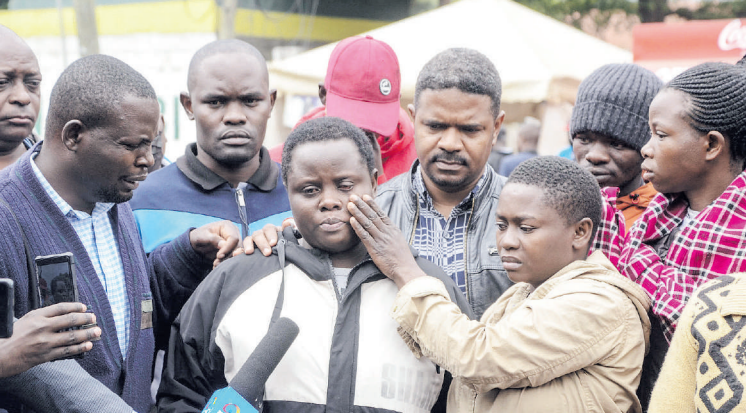

Twelve-year-old Bridgit Wainaina spent the afternoon like any other child — quietly at home in Ndumberi, Kiambu county, watching TV with her mother Lucy Ngugi — when a bullet tore through the wall and killed her.
It was just after 6.20 pm on Monday. The streets were restless, filled with chants and smoke as Saba Saba Day protests erupted across the country.
“I turned around and saw my daughter with blood on her hands,” Ngugi said, her voice cracking as she recounted her final moments with her daughter. “I thought she had been electrocuted. But when I touched her, trying to see where the blood was coming from, she became weak… and collapsed.”
What she had not yet seen was the small bullet wound in her daughter’s head. A stray bullet, suspected to be from a police officer, had pierced their wall and tore into Bridgit’s skull.
Ngugi's home is located nearly two kilometres away from the main road where protesters and police clashed. Yet, even at that distance, they were not safe.
As panic took over, Ngugi called her husband. With the help of neighbours and well-wishers, they rushed Bridgit to St Brigid's Hospital. Doctors scanned her, revealing the horrifying truth: a bullet had penetrated her brain.
“She died later that evening,” she tearfully narrated as her hands trembled. “We tried. But there is nothing the doctors could do.”
Bridgit’s death has shattered the community — and her family — leaving a silence in the home that once echoed with a child’s laughter. A Grade 7 pupil's life and dreams were ended on a living room couch, far from the frontlines of protests or confrontation.
But she is not the only innocent life lost this week.
In Kiambu town, 23-year-old Dennis Mwangi was also shot — this time in the back — just steps outside his house. His mother, Friday Kawira, unable to narrate her son's story without breaking down.
“He was not protesting,” she said. “He had just washed his clothes and stepped outside to see what was happening. The bullet hit him from behind and exited through his neck. He died on the spot, right outside our home.”
In Ndumberi village, another grieving mother, Margaret Wangui, is mourning her son Laban Kamau, who was shot in the head.
“Ndumberi is a village, not a town. We don’t understand why there were such violent protests here,” she said. “My son was not a criminal. Why did they shoot him like that?”
As families bury their children, they are also left to pick up not only emotional wreckage — but financial too. Many are now forced to look for the elusive money to cover mortuary fees, post-mortem costs and burial expenses, even when it is clear that their loved ones were extra-judicially killed.
“We are demanding justice,” Ngugi said. “We did nothing wrong. My daughter was just sitting at home.”
At Kangemi, two more men were killed during protests — Paul Makori, a 37-year-old bodaboda operator and Elvis Musavi, 25, described by friends as peaceful and unarmed.
“He was running away when the bullet hit him in the back,” said one of his friends. “We just saw him collapse under the Kangemi bridge.”
At the City Mortuary, seven bodies lie unclaimed — all with gunshot wounds. Vocal Africa executive director Hussein Khalid says the bodies were recovered from Buruburu, Kahawa West, Githurai, Kiserian and Ngong. But activists say the numbers are being downplayed.
He says the number of deaths is a set number as verification and documentation continue.
"We will only get more bodies and even right now I'm going to another mortuary to inspect a body. It is a sad state of affairs when the state is disregarding life," he said.
“I live in Ngong and I counted more than 10 bodies lying on the road,” activist Wanjeri Nderu says. “I posted photos of five bodies on my X handle. How can the government claim there were only three deaths?”
She says most bodies were picked up at night to minimise visibility and public outcry.
“The government is feeding the public with misinformation,” she says. “It’s heartbreaking. These were young men, many of them not even part of the protests.”
As outrage grows, so too does the call for accountability.
The families of Bridgit, Dennis, Laban and others are now demanding an independent investigation into police conduct and the use of live bullets during civilian protests. Human rights lobbies say the killings highlight a longstanding pattern of police brutality, especially in poor and informal communities.
But amid the calls for justice, it's the human pain — raw and unresolved—echoes loudest.
“She was just a child,” Lucy repeats, staring at the small, empty couch. “We were only watching TV.”











![[PHOTOS] Boniface Kariuki honoured with flag-draped coffin](/_next/image?url=https%3A%2F%2Fcdn.radioafrica.digital%2Fimage%2F2025%2F07%2Fc7df13cc-0b58-4ec7-b6a4-7e32e1d9ec63.jpg&w=3840&q=100)
